Text
Was ist eine Viton® (FKM)-Dichtung und welche Anwendungen gibt es?
Viele der anspruchsvollsten Dichtungsanwendungen erfordern eine Hochleistungsdichtung, die auch unter härtesten Bedingungen außergewöhnlich gut funktioniert. Solche Anwendungen erfordern häufig Dichtungen aus einer Familie von Fluorelastomeren namens FKM. Während Viton® der generische Name für FKM ist, ist es ein Markenname von DuPont für seinen synthetischen Kautschuk und sein Fluorpolymerelastomer.
Was genau ist FKM?
Die FKM-Elastomerfamilie besteht aus Copolymeren oder Terpolymeren von Tetrafluorethylen (TFE), Vinylidenfluorid (VDF) und Hexafluorpropylen (HFP), Hexafluorpropylen (HFP) und Vinylidenfluorid (VDF oder VF2) und Perfluormethylvinylether (PMVE). Da DuPont das erste Unternehmen war, das dieses Material auf den Markt brachte, ist sein Markenname Viton® der am häufigsten mit FKM in Verbindung gebrachte Name.
Die meisten synthetischen Kautschuke bestehen aus langen Ketten von Kohlenstoff- und Wasserstoffatomen. Diese Gummis neigen bei Kontakt mit Öl zum Aufquellen und haben einen begrenzten Temperaturbereich. Darüber hinaus zersetzen sie sich mit der Zeit bei UV-Bestrahlung (durch Sonnenlicht).
Wenn Fluor zu synthetischen Gummis hinzugefügt wird, bindet es sich fest an die Kohlenstoffatome und macht die Verbindung widerstandsfähiger gegenüber anderen Verbindungen, während es gleichzeitig enorme Flexibilität bietet. Dies verändert die Eigenschaften des Materials und macht FKM zu der Hochleistungsgummiverbindung, die für viele Anwendungen entscheidend ist.
FKM ist bekannt für seine hervorragende Beständigkeit gegen Hitze, Chemikalien, konzentrierte Säuren, Öle und aggressive Kraftstoffe.
Materialqualitäten für Viton®-Dichtungen
Auf der Grundlage der Materialzusammensetzung und der Anwendungen gibt es FKM in einer Reihe verschiedener Materialqualitäten. Einige davon sind:
Allgemeine Verwendungsqualitäten:
Viton® A
Viton® A-Dipolymere werden aus zwei Monomeren polymerisiert — Vinylidenfluorid (VF2) und Hexafluorpropylen (HFP). Es ist das am häufigsten verwendete Viton®-Dichtungsmaterial und wird als Gummidichtung für Schmier- und Kraftstoffe in der Luft- und Raumfahrt sowie im Automobilbereich verwendet.
Viton® B
Viton® B ist ein Terpolymer, d. h. polymerisiert aus drei Monomeren — Vinyliden (VF2), Hexafluorpropylen (HFP) und Tetrafluorethylen (TFE). Dieses Material wird hauptsächlich in der chemischen Verarbeitung, der Energieindustrie und in der Versorgungswirtschaft verwendet.
Viton® F
Viton® F ist ebenfalls ein Terpolymer, polymerisiert aus drei Monomeren — Vinylfluorid (VF2), Hexafluorpropylen (HFP) und Tetrafluorethylen (TFE). F-Typen bieten von allen anderen Viton®-Typen die beste Flüssigkeitsbeständigkeit. Sie sind äußerst nützlich in Anwendungen, die Beständigkeit gegen Kraftstoffpermeation erfordern.
Hochleistungsqualitäten:
Viton® GB und GBL
Viton GB und GBL sind Fluorelastomer-Terpolymere, die aus drei Monomeren polymerisiert sind — Vinylfluorid (VF2), Hexafluorpropylen (HFP) und Tetrafluorethylen (TFE). Diese Fluorelastomere verwenden eine Peroxidhärtungschemie, die zu einer überlegenen Beständigkeit gegen Säure, Dampf und aggressive Motoröle führt.
Viton® GLT
Dieses Fluorelastomer wurde speziell entwickelt, um die hohe Hitze- und Chemikalienbeständigkeit der allgemein verwendbaren Viton®-Typen beizubehalten und gleichzeitig die Flexibilität bei niedrigen Temperaturen zu verbessern. Außerdem bietet Viton® GLT eine um 8 bis 12 °C niedrigere Glasübergangstemperatur, was auf eine Leistung bei niedrigen Temperaturen in Elastomeranwendungen hinweist.
Wichtige Eigenschaften einer Viton®-Dichtung
Wenn es um Dichtungsmaterialien geht, ist eine gute Druckverformungsbeständigkeit oder die Fähigkeit zum Zurückfedern nach Entlastung erforderlich. Weitere wünschenswerte Eigenschaften sind ein breiter Temperaturbereich und eine gute Chemikalienbeständigkeit. FKM bietet in all diesen Punkten eine außergewöhnliche Leistung.
FKM wird gemäß dem ASTM D2000-Standard zur Klassifizierung von Elastomeren als „HK“ eingestuft. Hier zeigt H an, dass sich die Leistung einer FKM-Dichtung nach längerer Einwirkung von Temperaturen von 250 °C (480 °F) nur sehr wenig verschlechtert. FKM funktioniert auch bei niedrigen Temperaturen bis zu -40 °C (-40 °F) gut.
Wobei K die Widerstandsfähigkeit gegen Aufquellen angibt. Da K die niedrigstmögliche Bewertung ist, bedeutet dies, dass FKM weniger aufquillt als fast alle anderen Elastomermaterialien. FKM ist auch sehr chemikalienbeständig und widersteht Ozon, typischen Autokraftstoffen und Kohlenwasserstoff-Schmierölen. Allerdings liefert FKM keine so guten Ergebnisse gegen starke Säuren, Basen und Ketone.
Anwendungen von Viton® für Gummidichtungen
Viton®-Dichtungen wurden aufgrund ihrer Kraftstoffbeständigkeit und geringen Brenneigenschaften zuerst in der Luft- und Raumfahrtindustrie verwendet. Heute finden sie Anwendung in der Fluidtechnik, der Automobil-, Haushaltsgeräte- und Chemieindustrie. Darüber hinaus wurden die Einsatzmöglichkeiten von FKM mit der Einführung von FDA-Klassen auch auf die Lebensmittelverarbeitungs- und Pharmaindustrie ausgeweitet.
Viton®-Dichtungen werden für raue Umgebungen mit hohen Temperaturen dringend empfohlen. Aufgrund ihrer chemischen Beständigkeit werden sie häufig mit Schmier- und Heizölen, Benzin, Pflanzenölen, Alkoholen, verdünnten Säuren, Hydrauliköl und Kerosin verwendet. Darüber hinaus finden sich Viton®-Anwendungen auch in Kraftstoffdichtungen, Kappendichtungen, T-Dichtungen und Radiallippendichtungen in Pumpen. FKM-Dichtungen bieten außerdem eine hervorragende UV-Beständigkeit, was sie zu einer hervorragenden Wahl für Anwendungen macht, bei denen mit längerer Sonneneinstrahlung zu rechnen ist.
Wir hoffen, dass Sie diese Informationen nützlich fanden. Wenn Sie FKM- oder Viton®-Dichtungen für Ihre Anwendung suchen, stellt Harkesh Rubber erstklassige Produkte her, die Ihren Dichtungsbedarf decken. Tatsächlich können wir Niedertemperatur-FKM-Dichtungen herstellen, die bis zu -50 °C standhalten! Kontaktieren Sie uns einfach für Ihren Bedarf an Viton®-Dichtungen.
Mehr lesen…
0 notes
Text
Understanding the Importance of FKM Gaskets in Industrial Applications
What are FKM Gaskets?
FKM gaskets stand for Fluoroelastomer gaskets, they are synthetic rubber seals designed to create secure connections between two surfaces. In recent years, FKM has emerged as a crucial component for specialized gasket and seal industries, including chemical processing, petroleum, automotive, and aerospace. Their exceptional quality of resistance to heat, chemicals, and environmental factors makes them indispensable in various industrial settings. FKM are commonly referred to by their brand name, Viton® – a registered trademark of the Chemours Company.
The Significance of FKM Gaskets
In industries where machinery operates under extremely harsh conditions, maintaining tight seals is paramount for preventing the leakage of fluids or gases. FKM gaskets excel in environments where traditional materials may fail due to exposure to high temperatures, aggressive fuels, chemicals, or intense pressure without degrading or losing their sealing capabilities. Their versatility and reliability ensure integrity, efficiency, and safety in critical applications.
Read more...
0 notes
Text
A Comprehensive Guide to Choosing the Right Custom Sealing Manufacturer in India
The efficiency and reliability of industrial products are often based on the quality of seals used. That’s why companies from diverse sectors such as automotive, aerospace, pharmaceuticals, and many more choose Harkesh Rubber for their custom sealing needs. In this article, we will explore key considerations that can guide you in making an informed choice while choosing quality seals:
Material Options: Different applications require varied materials, and a reputable manufacturer should offer a wide range to meet varying needs. Each material has unique properties, such as resistance to heat, chemicals, abrasion, and flexibility.
At Harkesh Rubber, for example, we offer quality seals made of HNBR, NBR, FKM, Silicone, EPDM, and Neoprene. Our seals are versatile and cost-effective, making them suitable for a broad range of applications.
Customisation Capabilities: Look for manufacturers with robust customisation capabilities. This includes designing seals to fit unique shapes, sizes, and specifications. At Harkesh Rubber, we have experienced engineers who can collaborate with you to understand your application’s intricacies and offer solutions that enhance performance and longevity.
In addition to custom shapes and sizes, we also provide specialised features such as colour coding, branding, or unique markings. Customisation extends beyond the physical attributes of the seal to packaging and labelling, ensuring a seamless integration into your production process.
Quality Assurance and Certifications: Reputable custom sealing manufacturers adhere to stringent quality control measures and hold relevant industry certifications. These certifications serve as indicators of a manufacturer’s commitment to producing high-quality products that meet or exceed industry standards. Harkesh Rubber has ISO 9001-2015 certification, a globally recognised standard for quality management systems, ensuring consistency and traceability in manufacturing processes.
Supply Chain and Lead Times: Evaluate the custom sealing manufacturer’s supply chain capabilities. Harkesh Rubber has reliable sources for raw materials and can maintain consistent production levels. We offer short lead times and a reliable supply chain that can contribute significantly to minimizing downtime in your production process.
0 notes
Text
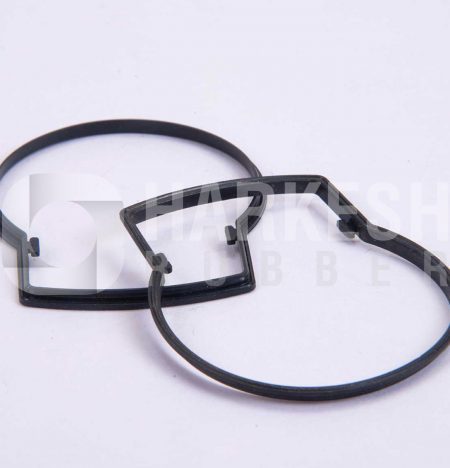
Harkesh Rubber holds a strong repute at production of custom rubber gaskets to cover all the sealing needs. Gaskets form an integral component of any solution which requires the confinement of a gas or liquid. Our company earned a testimony through delivery demonstration for one or the client’s by restoring problems with their OE systems of heat exchange.
0 notes
Text
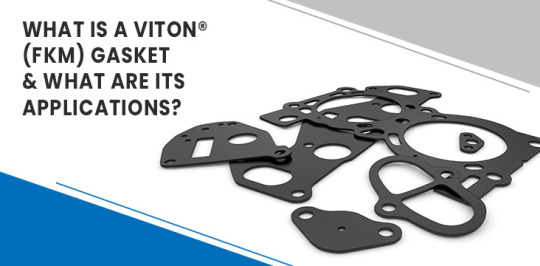
Discover the versatility of FKM seal gaskets in our comprehensive guide. Learn about Viton® (FKM), its applications, material grades, and key properties.
0 notes
Text
FKM Seals
Discover the versatility of FKM gaskets in our comprehensive guide. Learn about Viton® (FKM), its applications, material grades, and key properties.
Many of the most challenging sealing applications require a heavy-duty gasket that can perform exceptionally well in the harshest of conditions. Such applications often call for gaskets made from a family of fluoroelastomers called FKM. While Viton® is the generic name for FKM, it actually is a brand name of DuPont for its synthetic rubber and fluoropolymer elastomer.
The FKM family of elastomers consists of copolymers or terpolymers of tetrafluoroethylene (TFE), vinylidene fluoride (VDF) and hexafluoropropylene (HFP), hexafluoropropylene (HFP) and vinylidene fluoride (VDF or VF2) and perfluoromethylvinylether (PMVE). Since DuPont was the first company to really market this material, its brand name Viton® has become the most commonly associated name with FKM.
0 notes
Text
Rubber Gasket Manufacturers
Harkesh Rubber holds a strong repute at production of custom rubber gaskets to cover all the sealing needs. Gaskets form an integral component of any solution which requires the confinement of a gas or liquid. Our company earned a testimony through delivery demonstration for one or the client’s by restoring problems with their OE systems of heat exchange.
Case The customer had more than nine Heat Exchangers, all of which were due for replacement of their gaskets. Harkesh was successfully able to develop all the nine Heat Exchanger Gaskets within a span of just two months. This resulted significant cost savings and regained faster stability than expected.
0 notes
Text
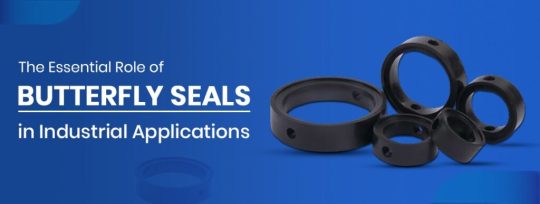
Explore how butterfly valve seals play a crucial role in various industrial applications. Learn about their versatility and importance in ensuring reliable and efficient processes
0 notes
Text
Role of Butterfly Valve Seals in Industrial Applications
Butterfly seals are sealing components that are designed to ensure a secure and leak-free connection between the valve disc and the valve body of a butterfly valve. These seals are primarily made of rubber or elastomeric materials and are available in a variety of designs to suit a variety of purposes.
Butterfly valves are widely used in various industries, including chemical processing, water treatment, HVAC systems, and many more. They are preferred for their ability to efficiently regulate fluid flow and control pressure. The efficiency of a butterfly valve is largely determined by the quality of its seals.
0 notes
Text
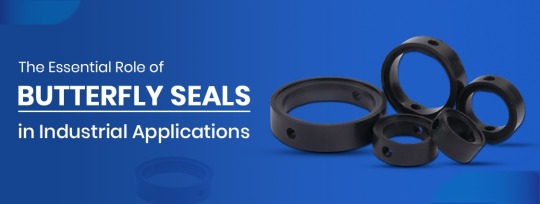
Essential Role of Butterfly Valve Seals in Industrial Applications
0 notes
Text
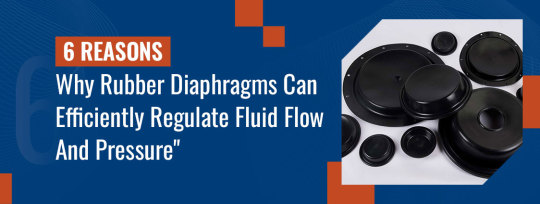
Reasons Why Rubber Diaphragms Can Efficiently Regulate Fluid Flow And Pressure
To know more visit Harkesh Rubber
0 notes
Text
6 Reasons Why Rubber Diaphragms Can Efficiently Regulate Fluid Flow And Pressure
Rubber diaphragms are flexible and circular membranes that serve as a seal between chambers. They come in a wide variety of sizes, shapes, and configurations. Made of elastomers or rubber, diaphragms are commonly deployed in applications to achieve precise control over fluid movement and pressure.
1. Efficient barriers that cleverly separate different fluids
Rubber diaphragms can isolate different fluids, preventing them from mixing or contaminating each other.
2. High flexibility that responds efficiently to pressure changes
Rubber diaphragms serve as pressure regulators by changing their shape in response to changes in fluid pressure.
3. Quality pumping and metering ability to transfer fluids
In pumps and metering devices, rubber diaphragms are often used to transfer fluids from one side to the other.
4. Efficient actuation mechanism to manage fluid pressure
Rubber diaphragms are used as actuators to convert fluid pressure into mechanical motion.
5. Capability to serve as a safety mechanism
In pressure relief valves, rubber diaphragms act as a safety mechanism.
6. Functionality as pressure sensors
Rubber diaphragms can be utilized in pressure sensors to detect changes in pressure and provide feedback to control systems.
As one of India’s preferred rubber diaphragms manufacturers, Harkesh Rubber offers the industry’s finest selection of rubber diaphragms. We are ranked among the leading rubber diaphragms manufacturers in India and can provide you with state-of-the-art diaphragms based on your needs.
0 notes
Text
Helping Businesses Overcome The Supply Crisis Faced In The Rubber Industry
$40.77 billion*. That’s how much the global rubber industry was worth in 2019. Then COVID-19 came and conquered, sending multiple rubber-based businesses into a frenzy. The industry is still recovering from that onslaught.
Nevertheless, the rubber industry is known for showing resilience in face of adversity. The industry is expected to touch $51.21 billion* by 2027 with a CAGR of 5.3% for the 2020-27 period.
Stakeholders in the industry were looking to recover swiftly from the side-effects of the pandemic when they were affected by the disruptions due to global supply.
There are many reasons for these disruptions. One of the reasons is because rubber derivatives such as FKM/Viton™ and silicone are in short supply. There is a rising demand for these rubber products but supply chains for rubber-based raw materials continue to be hit. Let’s not forget that the pandemic also led to a massive demand for silicone-based products such as healthcare elastomers. All of this has ensured that it will take some time for the industry to return back to normal.
At Harkesh Rubber, we have a steady supply of raw materials to meet your demands for FKM and FFKM. If you are facing a supply crisis, then you should get in touch with our team by calling us at +91-22-40060400 or sending an email to [email protected]. Together, we can overcome the uncertainties that cloud the rubber industry!
0 notes
Text
All You Need to Know About Rubber Seals for Solar Applications
The Solar industry has seen massive growth since the last decade, and it continues to evolve and advance as technology grows. Although solar energy applications are quite different from oil and gas applications, rubber seals are still needed to be durable and strong to face the toughest of conditions.
In solar applications, the rubber seals are usually exposed to different levels of heat, pressure, torque, and cold that challenge the stability of the seals. Also, solar energy applications can end up creating unique types of wear and tear. Sensitive components need to be sealed from prolonged exposure to debris and dust. These components also need to handle extreme sunlight and harsh weather.
With many hurdles and demands to overcome in the solar industry, here is what you need to know about rubber seals for solar applications.
Read More...
0 notes
Text
Importance of Rubber Gasket
A rubber gasket is a mechanical seal that is used to fill the space between two or more mating surfaces during compressions. This crucial sealing component prevents unwanted gas or liquid emissions. They are intended to be resistant to pressure, temperature fluctuations, and in some cases, electrical or electromagnetic forces.
To Know More Click Here
0 notes
Text
Rubber Diaphragms: Everything You Want to Know
A rubber diaphragm acts as a flexible barrier between two chambers. Know everything about the rubber diaphragm. Harkesh Rubber serves as an efficient rubber diaphragm supplier.
To Know More Click Here
1 note
·
View note